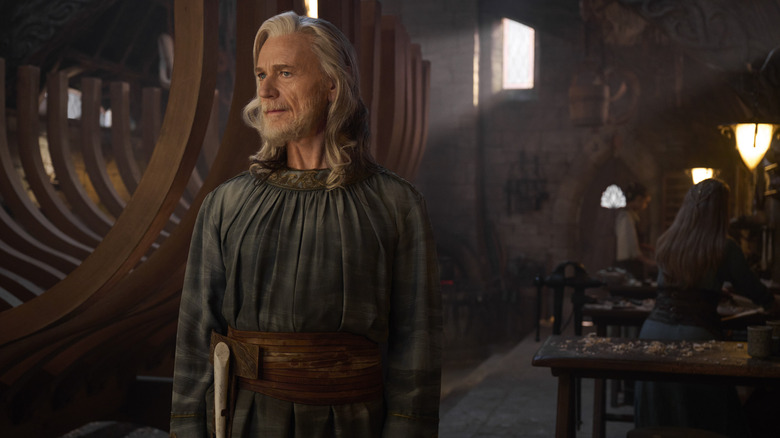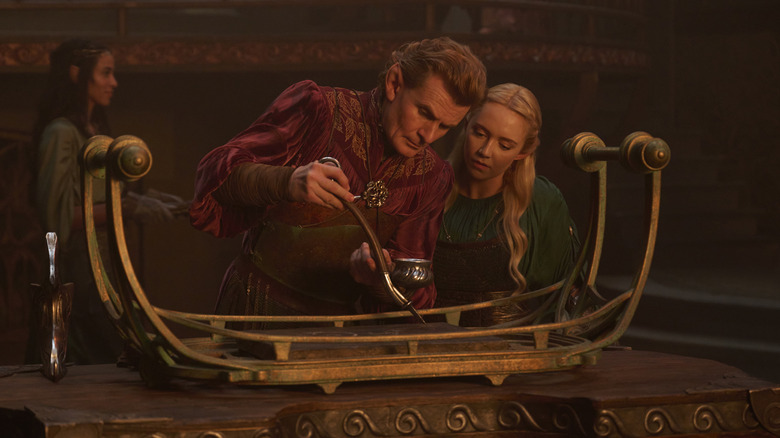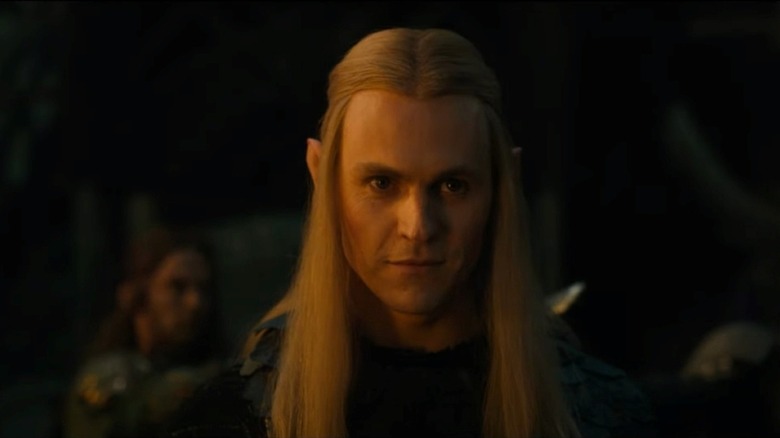The Lord Of The Rings: The Rings Of Power Season 2 Engages With One Of The Biggest Real-Life Questions Of 2024
This post contains spoilers for the first three episodes of "The Lord of the Rings: The Rings of Power" season 2.
"The Rings of Power" season 1 was all about the lead-up to Sauron's act of treachery: Fooling the elves into working with him to make the first three of the titular rings. Now, season 2 is dealing with the consequences of that treachery. If "The Lord of the Rings" is partially about how men's nature is weak and easily corruptible, but seeing them overcome that shortcoming to rise up and define their fate, then "The Rings of Power" is doing the same thing for elves, showing how their arrogance is just as dangerous for Middle-earth as the greed of men. We see this in how easily Halbrand played on Galadriel's stubbornness and determination, resulting in her bringing Sauron into an elven kingdom and rolling out the red carpet for him.
Thankfully, not everyone sees the beauty and use of Celebrimbor's jewelry. Elrond spends much of the first three episodes of the new season becoming the elf we know him to be in the movies — one obsessed with casting rings into a fire and destroying them. Though Gil-galad and Galadriel would rather risk using the rings for good than leave Middle-earth, Elrond knows that the act of choosing to wear the rings makes them Sauron's collaborators. The rings hold power, and they will change their wearers — probably not for good.
The second episode, however, offers a different perspective. Círdan the Shipwright, one of the oldest and wisest of elves, talks to Elrond about how the rings, despite their evil and deceitful origins, nevertheless hold beauty. According to Círdan, the elves shouldn't judge a work by its maker, but by the work itself. It is a great scene with a relevant conversation for our cultural era, in which modern audiences regularly discover that some of the people who made the things we love have engaged in bad behavior behind the scenes.
The rings and their evil maker
Whether through the "Harry Potter" series and its problematic author or the movies of disgraced producers like Harvey Weinstein and Scott Rudin, audiences are having to confront the idea that they need to separate the art from the artist if they are to continue enjoying many of the things they like. In the case of "Rings of Power," bringing up this conversation is fascinating because of the changes the show made to the origin of the rings. Rather than the three rings for elves being the last ones to get made in order to counter Sauron's power, they are the first ones to get made — and they're made as a last resort to keep the elves alive.
The elves would have to leave Middle-earth forever, and the power of the rings is the only thing that can save them. The same thing is happening with the dwarves, as Celebrimbor and Annatar (Sauron's alter-ego) are offering them their own rings of power in order to save their people after tragedy strikes Khazad-dûm. In addition to Sauron fooling different peoples of Middle-earth and tricking them with rings, he's actually giving the elves and the dwarves something they desperately need, presenting them as "gifts." That Galadriel and Gil-galad are so openly willing to use the enemy's tools for good and to fight against him is especially ironic considering Boromir's "Give Gondor the weapon of the enemy" speech that happens later on the timeline in "The Fellowship of the Ring," and Elrond and the others vehemently shut down that suggestion. Much like in the books, the elves of "Rings of Power" are more arrogant, proud, and flawed than we see in the Peter Jackson movies, and the show is portraying how their folly spelled doom for Middle-earth.
Should we even trust the Shipwright?
Though Círdan makes good points about how beautiful the titular rings of power are, and how their power also holds some good and not just evil, should we really trust what he says as absolute truth? Granted, Tolkien fans know the answer to whether or not the "three rings for the elven kings under the sky" are truly free of Sauron's influence, but all Elrond has to base his judgment is the word of an old elf with a shiny ring that gives him power over the waters.
Círdan is considered one of the wisest of all elves, alive even before the elves made it to Middle-earth from their birthplace in Cuiviénen, and Elrond seems to trust him. But the thing is, the audience knows Elrond is right. We know that no matter how much good the rings may bring, ultimately Sauron will make the One Ring, with the power to "rule them all," find them, and "in the darkness bind them" (meaning the other rings). We know the rings do in some way answer to Sauron, and they give him power — why the hell would Halbrand/Sauron/Annatar help Celebrimbor make the rings in the first place? By this logic, we shouldn't really trust Círdan when he says to separate the beauty of the work from the evils of its creator, because no matter how trustworthy the shipwright is, we know he is ultimately wrong about the ring's usefulness.
That adds a fascinating wrinkle to the conversation and what audiences should take away from it: Círdan makes some good points about separating the art from the artist, but since we know he's ultimately wrong in this case, should the final result overrule those points he made? By framing the conversation this way, free of the condescension or holier-than-thou morality it might have if these viewpoints being expressed by a different character, the writers of "Rings of Power" engage with this vital, exceedingly modern concern in a way that feels appropriate given how thorny and complex this topic is in all of our lives.


